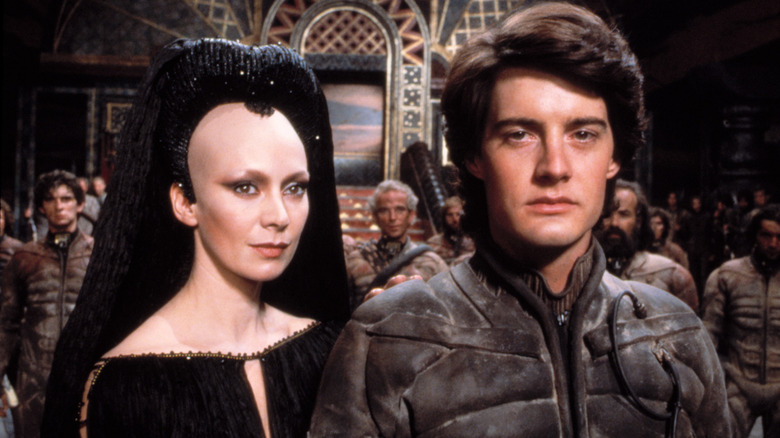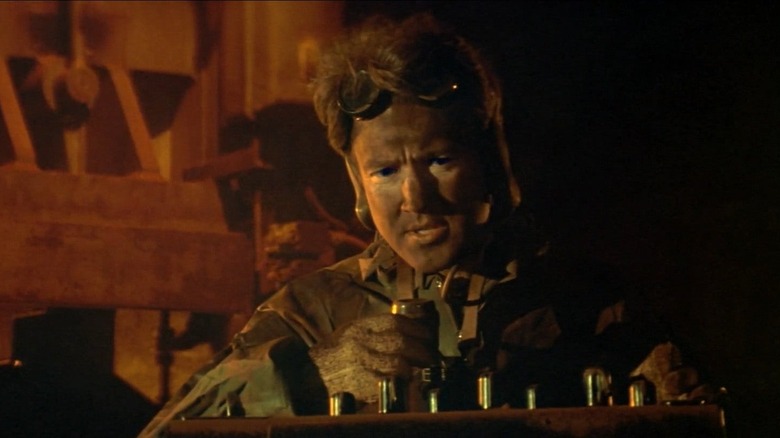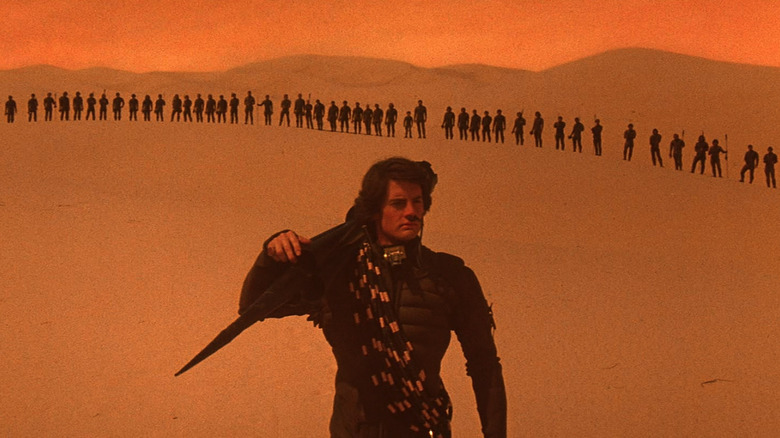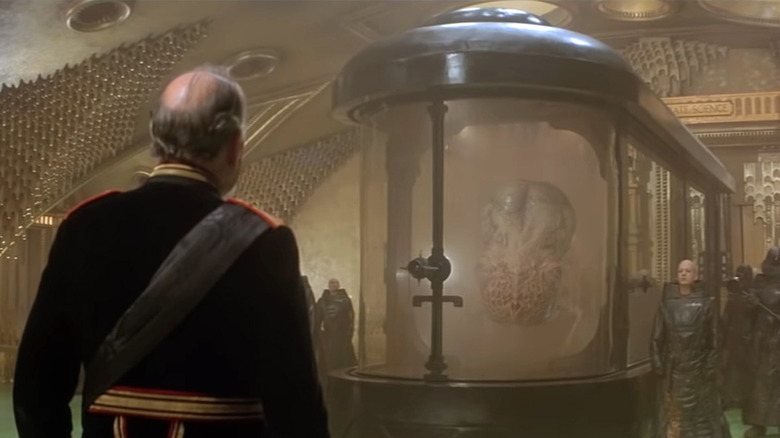David Lynch's Dune Is Better Than Its Reputation Suggests
Denis Villeneuve's "Dune" exists in the shadow of not just Frank Herbert's massive sci-fi tome, but also David Lynch's infamous adaptation that arrived in 1984. Universal Pictures, executive producer Dino De Laurentiis and his production company Dino De Laurentiis Corporation were all hoping that Lynch's take on Herbert's epic would be the next "Star Wars." It wasn't. The adaptation bombed at the box office, and in the years since its release, Lynch has all but disowned it. When extended cuts with extra scenes started making the rounds, Lynch went so far as to take his name of the movie entirely, his credit replaced by that famous Hollywood pseudonym Alan Smithee.
Lynch came to the project after cult director Alejandro Jodorowsky spent years trying to adapt the book into what would've been a strange, massive movie clocking in at 10 hours. Other filmmakers floated for "Dune" before Lynch included Ridley Scott, who would go on to make "Alien" instead, with many of the people who were working on Jodorowsky's failed film, and David Lean, someone who knew a thing or two about shooting in deserts, having helmed "Lawrence of Arabia." But it was ultimately Lynch who won the gig – an unconventional choice since the filmmaker hadn't even read the book when he was first offered the job.
Producer Raffaella De Laurentiis decided on Lynch after seeing the filmmaker's "The Elephant Man." There seems to be no real correlation between "Dune" and "The Elephant Man" other than they can both be considered "weird," and that was apparently enough to make Lynch an offer. As it turned out, the offer arrived at a time when Lynch was juggling several different things. "I was working on 'Blue Velvet' at the time, which kind of got derailed," Lynch told interviewer Chris Rodley. "I was in this space where I was trying to catch ideas to make it work. And then a weird thing started happening. I went to meet George Lucas who had offered me the third 'Star Wars' to direct, but I've never even really liked science fiction. I like elements of it, but it needs to be combined with other genres. And, obviously, 'Star Wars' was totally George's thing."
The idea of Lynch directing "Return of the Jedi" will always be one of those fascinating "what ifs?" in cinema. But it was not to be. Here's how the rest of the story goes, according to Lynch (and it's impossible to read what follows without hearing Lynch's distinct voice in your head):
"I got onto Thomas Harris' 'Red Dragon' with Richard Roth, who was gonna be the producer of 'Blue Velvet.' And then I kinda got turned off that. And about that time Dino De Laurentiis called the house. And Dino says, 'I want you to read this book, "Dune."' I thought he said 'June,' you know, and I said, '"June"?' He said, 'No, "Dune."' And so then a friend of mine said, 'Man! That's a great science fiction book,' and I said, 'I know, that's what I heard.' So I started reading it."
Murkier Realms
Lynch worked for sixth months with Eric Bergren and Christopher De Vore on a "Dune" script. The team delivered two drafts and then disbanded over creative differences. From there, Lynch took over, writing five more drafts. The final draft Lynch ended up with reduced Herbert's 400+ page book to 135 pages. Filming began in 1983, with the reported budget somewhere around $40 million. Over 80 sets were built on 16 different soundstages, and the crew consisted of at least 1,700 people. Lynch's film finally arrived in theaters in December of 1984 – and flopped. Taking in only $30.9 million from a $40 million budget, Lynch's film was also torn apart by critics. Roger Ebert gave it 1 star, writing:
"This movie is a real mess, an incomprehensible, ugly, unstructured, pointless excursion into the murkier realms of one of the most confusing screenplays of all time."
But is Lynch's "Dune" really all that bad? I'd seen bits and pieces of Lynch's film over the years but never sat down and watched the whole thing until recently, not long after I had seen Denis Villeneuve's big new take on the material. The first thing I was struck by was how similar Lynch's movie is to Villeneuve, at least in terms of how the story unfolds. Sure, both Lynch and Villeneuve were working from the same exact source material. But the first half of Villeneuve's movie is almost beat for beat the same as Lynch's. The two diverge at a point where Paul, the main character, heads off into the desert of Arrakis with the Fremen. Here, Villeneuve's movie ends – setting the stage for a sequel that has yet to be announced. Lynch's movie keeps going – but moves at an incredibly rushed pace, hurrying to wrap things up. One minute, Paul, as played by Lynch regular Kyle MacLachlan, is meeting Fremen member Chani (Sean Young). Nearly a minute later, the two are embracing and passionately smooching. Some time is meant to have passed, but it sure doesn't seem that way.
The second thing that struck me about Lynch's "Dune" is how much it feels like a David Lynch movie. After all the years spent hearing about how unhappy Lynch was with the film, and how angry he was at not being given final cut, I expected something lacking the filmmaker's distinct style and personality. But "Dune" very much feels in line with Lynch's other work, and I don't just mean it's "weird," which seems to be the go-to description for everything Lynch does. Lynch's "Dune" is overflowing with the filmmaker's esoteric charms, and the rumbling, grumbling, churning sounds of machinery – something I'm pretty sure Lynch has a fetish for – are always present. But most of all, Lynch's "Dune" is impenetrable, and I mean that as a compliment.
You Smell a Rat
Denis Villeneuve's "Dune" is huge; every cent of the budget is up on the screen, and whatever you think of Villeneuve's film as a whole, it's safe to say he's succeeded in crafting a big, sweeping blockbuster. The worlds here feel genuine. But they also feel ... familiar. We're meant to be thousands and thousands of years into the future jumping from one alien world to another, and yet, everything on display feels perfectly natural. On one hand, that's a good thing – it lends a certain realism to the proceedings; as realistic as a movie with giant Sandworms can be, at least.
Lynch's film, in contrast, often looks strangely cheap, and claustrophobic. The sets, while delectably dressed, are also closed-off with low ceilings, littered with clutter. The visual effects are often laughably bad, even for 1984. And yet, all of this helps Lynch's film rather than hurt it. Because all of these details, combined with Lynch's puzzling screenplay choked with dialogue that Ebert described as having "little or no context," make the 1984 "Dune" feel truly alien. Nothing here is recognizable. It's as if we've stumbled into some parallel universe. Few sci-fi films capture the unearthly, indescribable vibe Lynch has created here; the closest example would be Stanley Kubrick's superior "2001: A Space Odyssey," at least in terms of the cold distance between us and what's happening on the screen.
This can be seen as a blessing or a curse. I can perfectly understand why some audiences didn't connect with the out-of-this-world tone Lynch conjured. There's nothing, and no one, for us to grab ahold of. Timothée Chalamet's slight, youthful Paul is someone we feel like we could meet in real life. MacLachlan's Paul, with his constant shouts to the heavens and repeated inner phrases ("Arrakis. Dune. Desert planet.") is a mystery.
The Sleeper Has Awakened
Lynch didn't create all this in a bubble, and producers were painfully aware that the filmmaker had helmed something so inexplicable. To make sense of it all, Lynch added inner monologues for nearly every character here – something I'm now almost positive inspired filmmaker Terrence Malick, who uses the same technique with much better results. "40 percent of [the voice-over] was added on to nail things that they thought people wouldn't understand," Lynch confessed. But while this isn't the worst idea, it doesn't do "Dune" any favors. As Lynch put it: "It can be a beautiful thing – to hear thinking. It's a nifty thing, but when it's just for information, you smell a rat."
Villeneuve's "Dune" is a film made for the widest possible audience. It is epic scope, pulse-pounding action, and massive special effects all congeal to result in a sci-fi epic that will appeal to folks from all walks of life. And that's fine. But while I think Villeneuve's "Dune" is more successful on this front, I find myself more enamored with Lynch's otherworldly take. The filmmaker, in his own words, was "actively involved in creating a certain look" for the film, and it shows in nearly every frame. When the Guild Navigator arrives and is presented as some sort of giant brain-bug-thing floating in a tank of gas, it's stunning in its unfamiliarity. There's nothing even close to that in Villeneuve's movie. Stellan Skarsgård's Baron Harkonnen is appropriately villainous and vile, but Kenneth McMillan's Harkonnen is repulsive in innumerable ways. Just being around him makes us ill.
None of this is to say Lynch's "Dune" is some unjustly maligned masterpiece. The film's flaws are sprawling – the voice-over really is quite clunky and often needless and the story is rushed. Yet, the rushing also allowed Lynch to tell a complete story – something that can't be said for Villeneuve's "Dune," which is very much the first part of a two-part tale. But when Lynch gives us images of practical effect Sandworms created with puppetry, and has Sting strut into scenes donning plastic bikini briefs, it's hard not to get swept up in it all. To feel as if we're witnessing something incredibly unique and strange. Villeneuve's "Dune" makes us think of "Star Wars" by way of "Game of Thrones." Lynch's "Dune" makes us think we've never seen anything like this before, and probably never will again.



